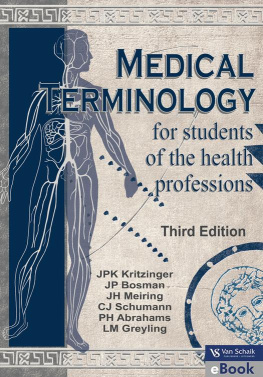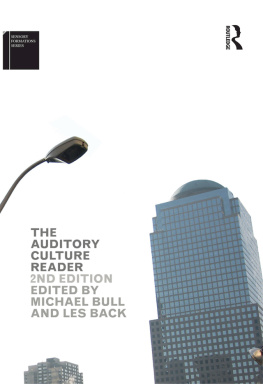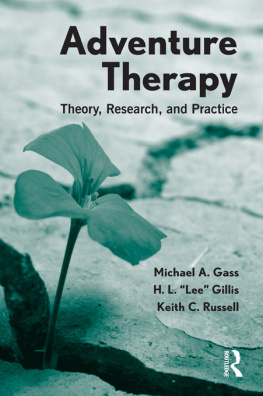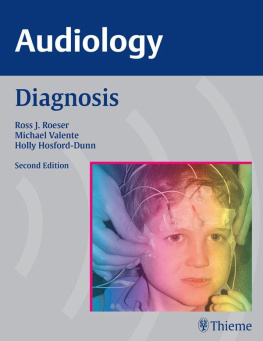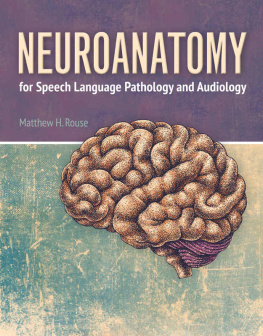AUDIOLOGICAL RESEARCH OVER SIX DECADES
Editor-in-Chief for Audiology
Brad A. Stach, PhD
Also Available From James Jerger
Binaural Interference: A Guide for Audiologists
James Jerger, Carol A. Silverman
James Jerger: A Life in Audiology
James Jerger
Audiology in the USA
James Jerger
Order at https://www.pluralpublishing.com
AUDIOLOGICAL RESEARCH OVER SIX DECADES
James Jerger, PhD


5521 Ruffin Road
San Diego, CA 92123
e-mail:
Website: https://www.pluralpublishing.com
Copyright 2022 by Plural Publishing, Inc.
Typeset in 11/14 Palatino by Flanagans Publishing Services, Inc.
Printed in the United States of America by Integrated Books International
All rights, including that of translation, reserved. No part of this publication may be reproduced, stored in a retrieval system, or transmitted in any form or by any means, electronic, mechanical, recording, or otherwise, including photocopying, recording, taping, Web distribution, or information storage and retrieval systems without the prior written consent of the publisher.
For permission to use material from this text, contact us by Telephone: (866) 758-7251
Fax: (888) 758-7255
e-mail:
Every attempt has been made to contact the copyright holders for material originally printed in another source. If any have been inadvertently overlooked, the publisher will gladly make the necessary arrangements at the first opportunity.
Disclaimer: Please note that ancillary content (such as documents, audio, and video, etc.) may not be included as published in the original print version of this book.
Library of Congress Cataloging-in-Publication Data
Names: Jerger, James, author.
Title: Audiological research over six decades / James Jerger.
Description: San Diego, CA : Plural Publishing, Inc., 2021. | Includes bibliographical references and index.
Identifiers: LCCN 2021017668 (print) | LCCN 2021017669 (ebook) | ISBN 9781635503708 (paperback) | ISBN 9781635503692 (ebook)
Subjects: MESH: Jerger, James. | Audiologyhistory | Hearing Disordershistory | Biomedical Researchhistory | History, 20th Century | History, 21st Century | United States | Case Reports
Classification: LCC RF290 (print) | LCC RF290 (ebook) | NLM WV 11 AA1 | DDC 617.8dc23
LC record available at https://lccn.loc.gov/2021017668
LC ebook record available at https://lccn.loc.gov/2021017669
Contents
by Brad A. Stach
.
This book is an adventure. It tells the story of the evolution of diagnostic audiology through the voice of one of its greatest contributors, Dr. James Jerger. His story begins in the late 1950s during his formative years as a student of Raymond Carhart and other notables, continues through his prolific years at the Baylor College of Medicine, and ends with his final act at the University of Texas at Dallas. Jergers lively narrative describes, in his wise and witty way, what he was thinking throughout six productive decades of game-changing audiological research. He provides us with a view, through case studies of his own work, of an unparalleled perspective, from the room where it happened.
I first met Dr. Jerger when he was lecturing at a symposium in Nashville in the late 1970s. I was a young masters degree student at Vanderbilt University. In those days, that was the clinical degree for entry into the audiology profession. I have this vague memory of that lecture, and it went something like this: He seemed to be presenting case after case after case, and I kept wondering, where are the data? In the classroom and from their treatment in the literature, of course, we were taught that a disorder is some sort of homogeneous entity and that test outcomes should be reflective of that. We were taught to wonder, how do groups of people with the disorder perform on various diagnostic measures? If they vary, then there must be something wrong with the test or, perhaps, with the disorder. It was not until I studied with Jerger that I began to understand.
In 1981, I joined the group at the Baylor College of Medicine as a PhD student under Dr. Jergers tutelage. My first research assignment was in the lab of Dr. Makoto Igarashi and Dr. Glenn Thompson, where I was studying the effects of cortical control and the location of motoneurons of the stapedius reflex in squirrel monkeys. But at the end of every day, I would wander down to the clinic to join the clinical staff in their daily case staffings with Dr. Jerger. (I say daily, but during sailing season, we might be found sneaking away on Wednesday afternoons to Galveston Bay for an afternoon on Dr. Jergers sailboat Ixchel.) It was at these staffings that I began to understand the tremendous value of peer review, the power of the test battery approach to clinical data collection, and the important lessons that we could learn from individual patients. After I graduated, I stayed on with the team at the Baylor College of Medicine and the Methodist Hospital of Houston for a number of years and never missed a case staffing. During my 11 years there, I came to know Jim Jerger as an excellent scientist with the strongest theoretical background, but one who had unmatched clinical credibility.
I tell you the story about case staffings because, as I was reading this book, I was struck by how often he uses case studies to help explain to you as a reader the point he is trying to make about the topic. In his , on auditory event-related potentials (AERPs), he says it best: That is why we have focused so much of our work in AERPs on individual listeners, whether normal or abnormal: because as clinicians, we all want methods and techniques that we can use to investigate people, not groups of people. In these days of big data and meta-analysis, this is a refreshing reminder of the importance of the individual and what we can learn from the variability of individual clinical outcomes.
I left the Baylor College of Medicine in 1992. In those days, our only real mode of communication was the telephone, and back then, they had cords. So, communication was not as simple as today, and I remember how much I missed understanding Dr. Jergers perspective on things. One thing I could count on, though, was that every month, he would write an editorial as Editor of the Journal of the American Academy of Audiology. I remember looking forward to understanding what interested him and what he saw as important in the work of others. I had the same anticipation as I was reading this book. I was there for a part of it, and I still found it interesting to see it through his eyes.
The book begins with a chapter on the early years of diagnostic audiology. It is interesting on any number of levels, but I tried to imagine what it must have been like back in the days before computers, signal averaging, or radiologic imaging. His description of the approaches to the diagnostic questions is fascinating and, in particular, why he pursued loudness measures. It seems quite likely that it has been a while since the last publication of a Bksy audiogram, but you will see one in this chapter. Perhaps I never quite understood, or I had just forgotten, how rapidly a disordered auditory system can undergo adaptation. It made me wonder if some of the difficulty we have now in pinning down pure-tone thresholds on patients with auditory neuropathy might be related to how rapid this is in an asynchronous system. The chapter also includes a discussion of the Synthetic Sentence Identification (SSI) test. Students of speech audiometry should go back to the early work of Speaks and Jerger to learn why they chose the targets and competition for this test. The test might seem quirky, but it had the strikingly real advantage in that it actually worked as an effective clinical tool for identifying retrocochlear disorder and APD.


